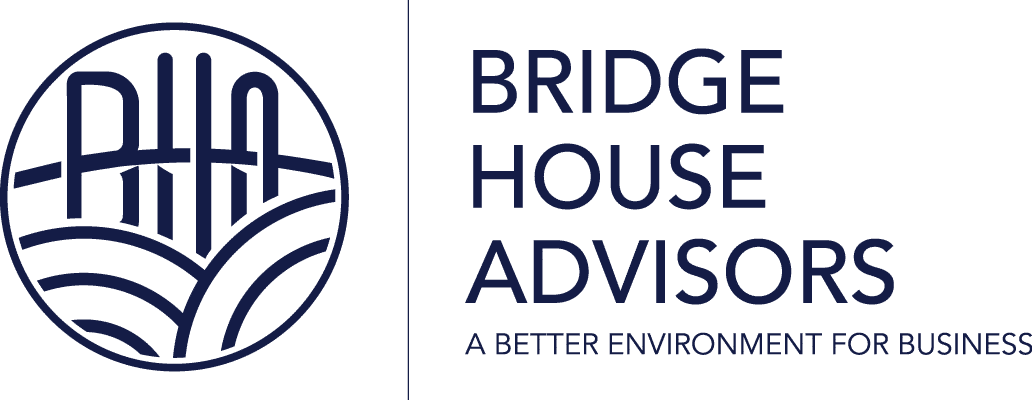The Road Well Traveled: An Employee Perspective
The Road Well Traveled: An Employee Perspective Bridge House Advisors is super proud of our…

Is ESG A Four-Letter
Word?
Grammatically, technically, and economically – No. Yet this acronym has certainly garnered much attention over the last year leading to a misconception of what it is all about. Of course, when ESG (Environmental, Social & Governance) gets politicized from governors’ offices to the White House, and large investment institutions want to strike it from their public communications, it does sensationalize the acronym arguably more than it should.
While the noise and rhetoric will most certainly continue to persist, now is a great opportunity to make sure organizations in both public and private markets are clear on their ESG strategies, priorities, commitments, and communications.
Where is all of this coming from?
First, let’s remind ourselves that ESG is not new. Sound ESG practices are vital to operating a responsible, ethical, and profitable business with some of these practices having been around for decades. At its core, ESG is a lens through which to assess key drivers of business value and risk, with management systems that have metrics to report on what matters for a company or firm, often using standardized frameworks.
So where is all the “backlash” coming from? This backlash can be sorted into 3 groups. First, there is heathy skepticism. This is especially true of investment products that carry ESG labels. Will this fund perform better? Compared to what? Does it really necessitate a higher fee? Second is philosophical opposition. This challenges the emphasis of ESG in the context of operating and financial performance. In this view, ESG distracts from the main mission of delivering financial performance and being overly regulatory driven. Third is opportunism. Individuals or entities provide a “woke” or elitist view of ESG for their own personal or political benefit, which often gets confused and wrapped up into societal issues.
From Bridge House’s perspective – this has been mainly noise related to the mixed messaging of the ‘raters’ and ‘rankers’ in the public markets, as well as institutional investors positioning ESG-oriented products to the younger generations of retail investors. And to be fair, much of the concern of the misuse of “ESG” themes in the public markets are justifiable. Unfortunately, these concerns have been inappropriately conflated with the private markets. The recent anti-ESG commentary has made for splashy headlines in our fast news cycles, but we believe that in the private markets, ESG excellence is simply a proxy for good business and core to what many companies have been doing for decades. Bridge House strives to help quantify and message on making ESG practical, actionable, and valuable for our clients and their stakeholders.
How to cut through the noise?
The perceived adversity of backlash can be turned into an advantage for companies and firms. There is an opportunity to provide more clarity to your ESG or Sustainability program by making sure your key tenets of ESG align to your overall business strategy. After all, the focus is on capital preservation at a minimum with an objective of value creation. Good ESG programs include purposeful practices to accomplish that value creation objective. Sharpening that link between ESG and value creation is a strong tactic to dampen any direct or indirect ESG “backlash”.
Taking it a step further, firms and companies should re-enforce their focus areas and established practices. For investment firms, this could be standard levers based upon the industry sector(s) represented within the portfolio. For example, firms with more industrial portfolios can promote the consistency and performance of employee health and safety programs. An emphasis area like employee safety not only helps the P&L with reduced employee lost time and improved insurance premiums, but also, it can provide a higher enterprise value at exit because of avoided direct and indirect costs. Another example is energy management and carbon footprinting. Efficient processes that consider resource use can significantly reduce energy consumption while baselining the carbon footprint and, through continuous improvement over time, will put the company on an initial path of de-carbonization with a near-term ROI. Lastly, sometimes the little “e” gets lost in the big “S” of Social. Equitable pay. It is very easy to rally around improved and equitable pay and hard to debate. Improving compensation in these cases is not merely a hand-out. Far from it. It is a conscious decision to improve factors like the company’s reputation, reduce employee turnover, and ultimately make the company more competitive.
All these examples can be messaged appropriately to strengthen the importance, and results, of ESG for your firm. These are practical applications in your ESG communications strategy and should always tie back to your overall business strategy. Try to avoid dramatic shifts or changes in your communications and do not feel the need to respond to every ESG topic. Chasing ESG talk tracks that are not relevant for your firm could turn the “backlash” into “whiplash.”
Pick and Stick
There are strong forces in capital and labor markets that justify a continued focus on ESG. Some examples are finalization of the SEC’s climate-related disclosure rules, implementation of the EU’s Corporate Sustainability Reporting Directive that will have broad reach, and further standard setting for sustainability reporting by the International Sustainability Standards Board (ISSB). Reporting and disclosure obligations will continue to rise, and along with that the noise of ESG “backlash.”
Picking a clarified and aligned ESG program and sticking with it through portfolio lifecycles will enable firms to effectively communicate and demonstrate that this is not new and not a fad. It is fundamental to the firm’s investment and management philosophies.
So, is ESG a four-letter word? Absolutely not.
Learn more about Bridge House Advisors’ ESG Program Development and Support services.
The Road Well Traveled: An Employee Perspective Bridge House Advisors is super proud of our…
One Year at Bridge House: An Employee Perspective Bridge House Advisors is super proud of…
2023 Bridge House Advisors CEO Interview – Christer Setterdahl Welcome to the launch of Bridge…
